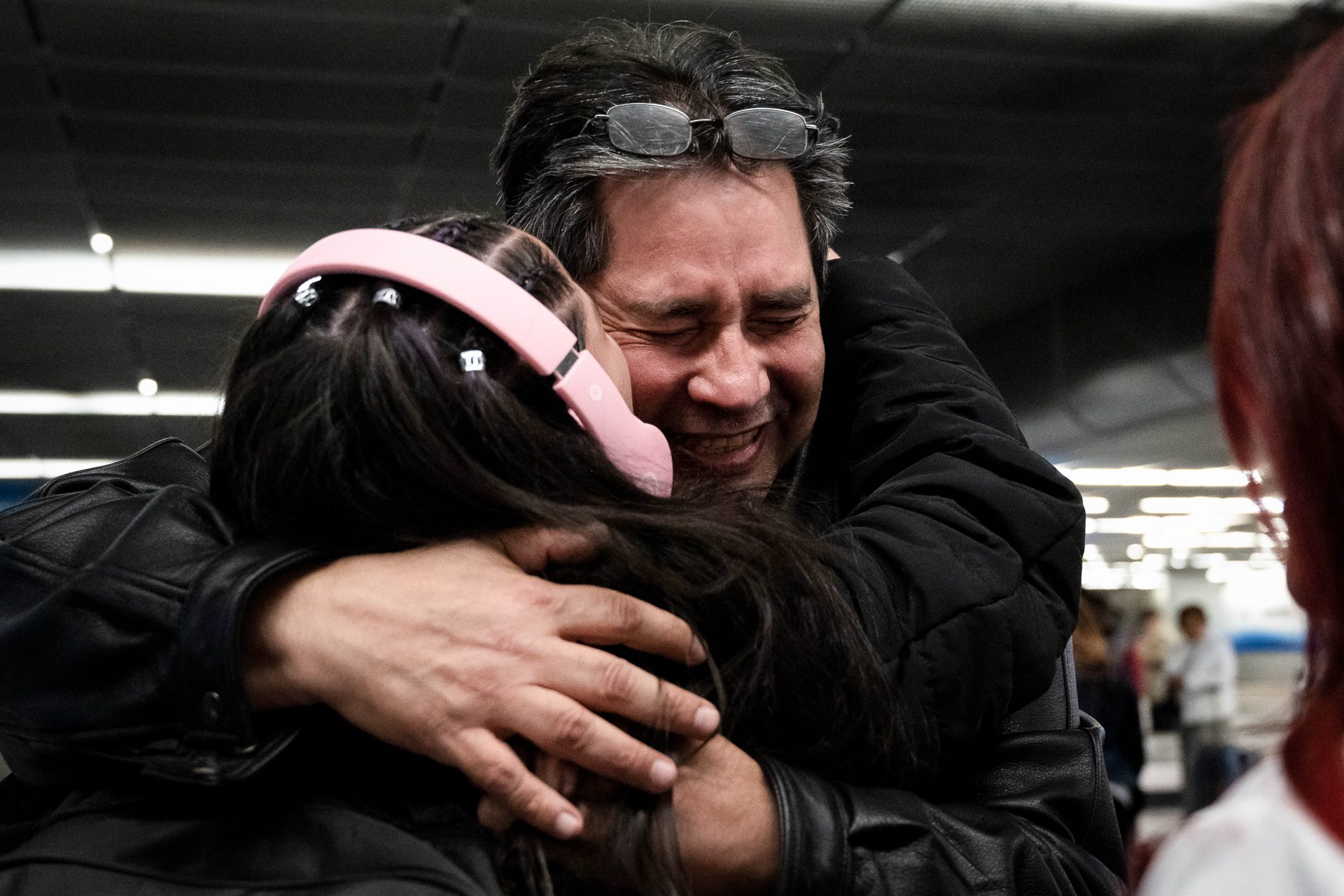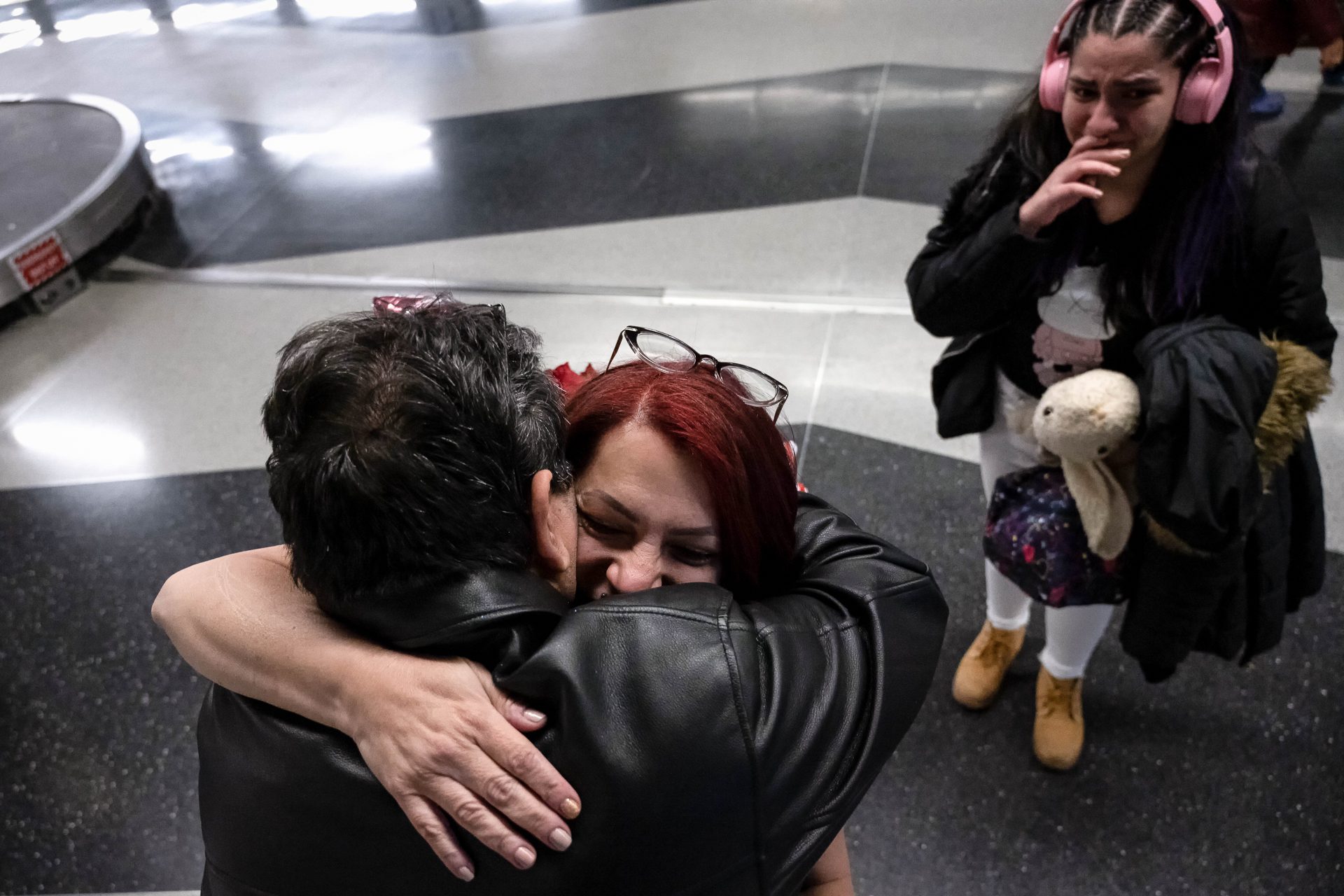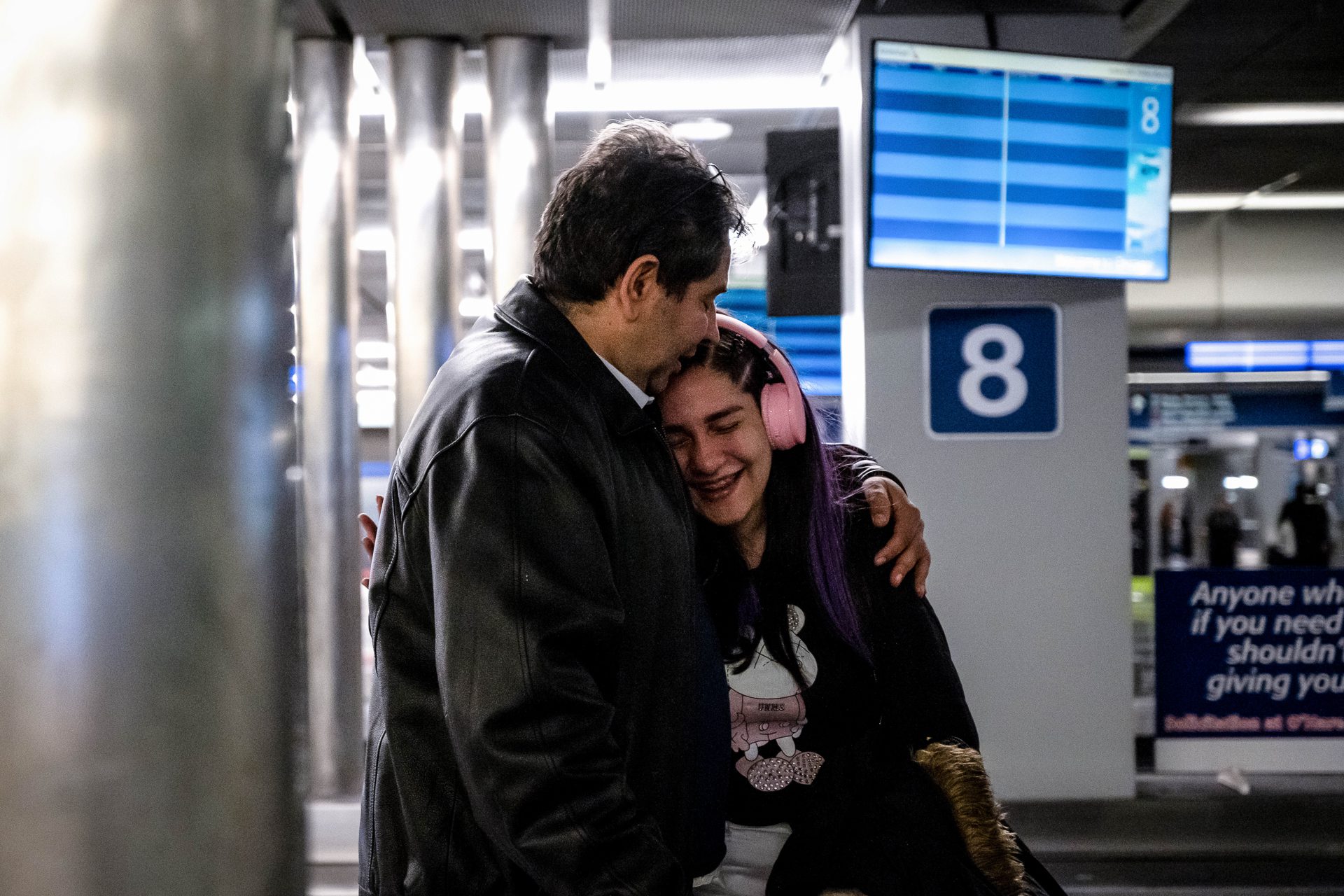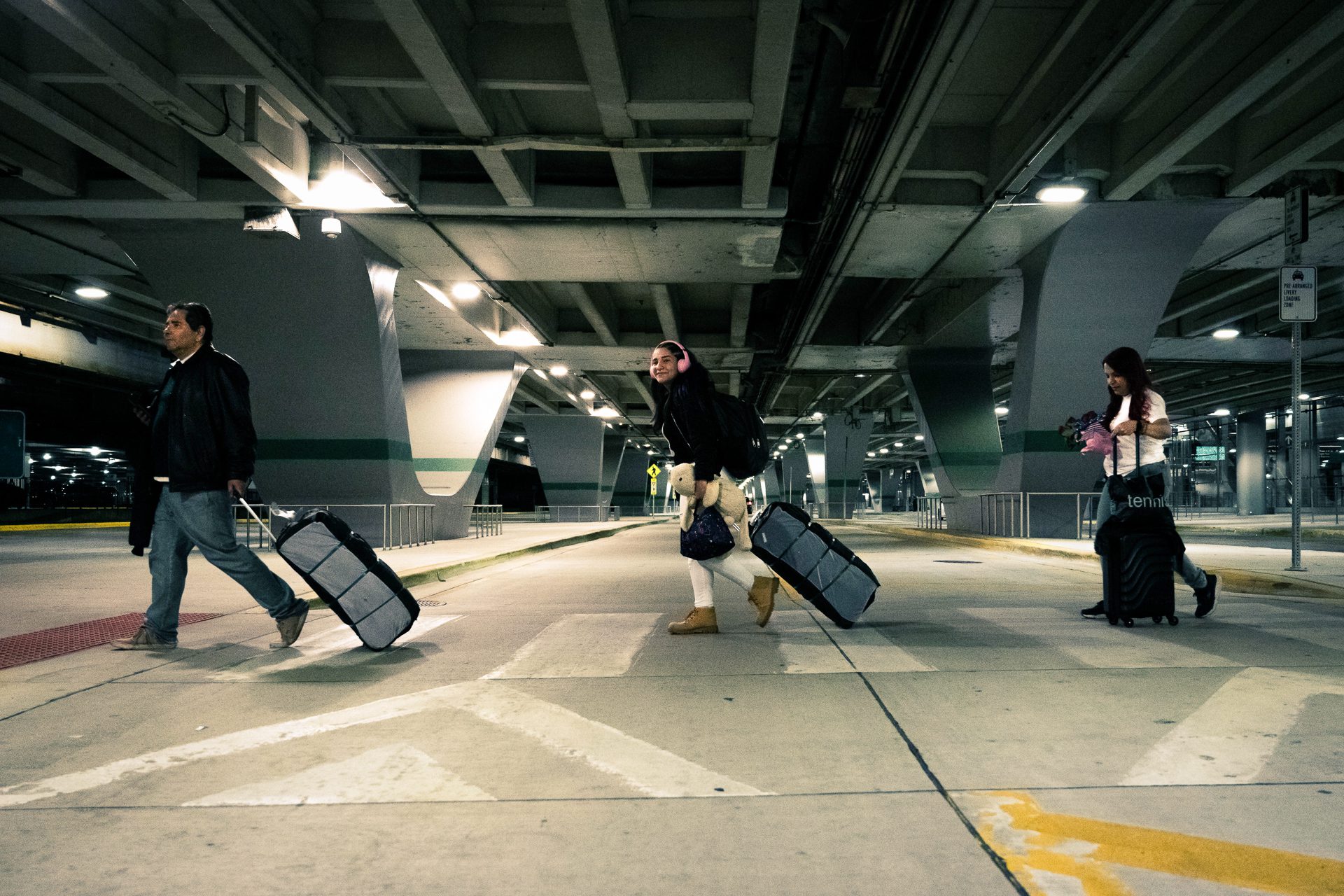 Anthony Jackson para Borderless Magazine
Anthony Jackson para Borderless MagazineFrank Sandoval tuvo que abandonar Venezuela para salvar su vida. Se hizo abogado para ayudar a otros a solicitar asilo. Tras un proceso de cinco años, se reunió con su mujer y su hija en Chicago.
Frank Sandoval estaba inquieto en la recogida de equipajes del aeropuerto de O'Hare casi a las dos de la madrugada del viernes 26 de mayo. En la mano izquierda llevaba un ramo de rosas rojas y globos atados con un lazo de la bandera estadounidense. El vuelo de su mujer y su hija se había retrasado casi ocho horas, y sería la primera vez que se verían en cinco años.
"Ahora mismo soy el hombre más feliz del mundo", dijo Sandoval mientras observaba el pasillo del aeropuerto en busca de su familia.
Apenas había dormido la noche anterior en previsión de este momento. Para sorprender a su familia, Sandoval había preparado una limusina con champán para llevarlos a casa, pero el conductor tuvo que marcharse porque llevaba horas de retraso. En su lugar, el buen amigo de Sandoval se sentó en el aparcamiento del aeropuerto, esperando para llevar a la familia de vuelta a su apartamento en Lockport, un suburbio del suroeste.
Noticias que ponen el poder en el punto de mira y a las comunidades en el centro.
Suscríbase a nuestro boletín gratuito y reciba actualizaciones dos veces por semana.
Más de 8.500 venezolanos han llegado a Chicago desde agosto de 2022 en autobuses por orden del gobernador de Texas, Greg Abbott. Esta es solo una fracción de los más de siete millones de refugiados y migrantes que han abandonado Venezuela desde 2014 huyendo de la crisis económica y la violencia política. Como Sandoval, muchos han solicitado asilo en Estados Unidos, una forma de protección que permite permanecer en el país a las personas que temen ser perseguidas o sufrir daños. Pero conseguir asilo aquí es largo y difícil.
Esta crisis se ve agravada por la escasez de abogados especializados en asilo y la sobrecarga del sistema de tribunales de inmigración, que deja a los solicitantes de asilo en una situación desesperada. una de cada tres solicitudes de asilo presentadas desde octubre de 2000 sigue pendiente.

Borderless conoció a Sandoval en 2022, durante los primeros días de la crisis migratoria venezolana. Era voluntario en Illinois Access to Justice para ayudar con la admisión en los refugios locales, y compartió su historia sobre su largo y difícil viaje hacia el asilo.
Sandoval llegó a Estados Unidos en 2018, huyendo de la persecución en Venezuela por su afiliación a un grupo antigubernamental. Tomó la difícil decisión de dejar en Venezuela a su mujer y a su hija.
Muchas cosas han cambiado para Sandoval y su familia desde la última vez que estuvieron juntos.
Se trasladó de Nueva Jersey a Nueva York y finalmente a Chicago, donde empezó a trabajar como asistente jurídico. Le concedieron el asilo tras cuatro agotadores años de papeleo y comparecencias ante los tribunales, representándose a sí mismo en los tribunales porque no podía permitirse un abogado de inmigración ni encontrar asistencia jurídica gratuita. Entonces empezó de nuevo el proceso, solicitando al gobierno el asilo que permitiría a su esposa e hija trasladarse a Estados Unidos.
En los cinco años que estuvieron separados, Sandoval aprendió a vivir solo. Aprendió a cocinar solo porque echaba de menos la comida de su mujer, "hecha en casa, nunca comprada". Los restaurantes cercanos no se comparaban con la deliciosa cocina de Carolina Alemán de Sandoval. Frank dijo que echaba de menos todo lo que ella cocinaba, pero que le encantaba especialmente su crujiente pollo a la parrilla.
También lidiaba con la soledad, a veces abrumadora, que sentía al estar lejos de su familia. En los últimos cinco años murieron su hermano, su hermana mayor y su sobrino. No pudo asistir a ninguno de sus funerales y guardó luto desde lejos. Y el día que se enteró de que a su mujer y a su hija les habían concedido asilo y les habían permitido venir a Estados Unidos, Sandoval recibió la llamada de que su madre había muerto.

"Le dije: 'esto es un regalo de mi madre'", cuenta Sandoval. "Ella sabía que iba a estar sola".
Sandoval dijo que su madre siempre le preguntaba por el estado de su caso y que quería que se reunieran cuanto antes. Ahora, a pesar de sus pérdidas, los años solo estaban a punto de terminar.
Carolina Alemán de Sandoval había estado compartiendo fotos y vídeos de su viaje a Estados Unidos desde Venezuela, documentando sus vuelos y la emoción de ella y Massiel Sandoval. El vídeo más reciente que había recibido era el de su despegue de Bogotá (Colombia), donde se encuentra la embajada de Venezuela en Estados Unidos.
Después de contar los días que faltaban para volver a estar con su familia, estaba a pocos minutos de tenerlos en sus brazos.
Una familia reunida
En el aeropuerto, Sandoval empezó a llorar al ver acercarse a su mujer y a su hija. Soltaron exclamaciones mientras se abrazaban, y Massiel Sandoval contuvo las lágrimas. Por fin volvían a estar juntos.
"[Nuestro tiempo separados fue] terrible, horrible, y tuve una depresión muy fuerte todos los días", dijo Carolina Alemán de Sandoval, agarrando el ramo y los globos. Aunque Carolina Alemán de Sandoval tiene su visado estadounidense desde hace varios años, se quedó en Venezuela hasta que Massiel Sandoval pudo venir también. "Me quedé por mi hija, ofreciéndole protección, amor y orientación desde que estaba en una edad muy difícil [entonces], 16 años".
Para Massiel Sandoval, pasar la adolescencia sin su padre fue muy duro.
"Ha sido bastante duro, incluso emocionalmente, psicológicamente, todo", dijo Massiel Sandoval entre sus propias lágrimas. "Mi madre se sacrificó para estar conmigo, y la quiero, pero volver a estar con mi padre es simplemente lo mejor que me ha pasado en todos estos años".
Los tres siguieron abrazándose, sonriendo y llorando. Y aunque estaban agotados por casi 24 horas de viaje, estaban encantados de poder estar cara a cara una vez más.

El futuro
La familia está deseando que empiece su nueva vida juntos en Illinois. Sandoval ha solicitado su permiso de residencia, y Carolina Alemán de Sandoval y Massiel Sandoval solicitarán el suyo el 17 de noviembre de este año. Por ahora, están planeando un viaje al zoológico de Brookfield y a un parque local. También planean obtener para Massiel Sandoval y Carolina Alemán de Sandoval tarjetas de la Seguridad Social, teléfonos y cuentas bancarias. Carolina Alemán de Sandoval piensa repasar su inglés asistiendo a clases en el Joliet Junior College, y Massiel Sandoval tiene previsto empezar a estudiar a tiempo completo en cuanto obtenga su tarjeta de la Seguridad Social.
Y en cuanto a recuperar el tiempo perdido, eso empieza ya.
"Queremos recuperar todo ese tiempo que perdimos por no desarrollarnos como uno solo, compartir el día a día, cocinar juntos, apoyarnos y seguir adelante", dijo Carolina Alemán de Sandoval.

